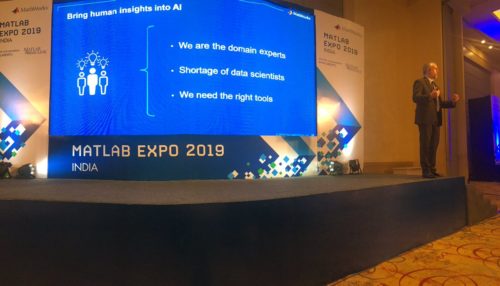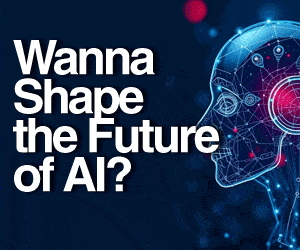The latest Artificial Intelligence (AI) forecast by McKinsey says that AI will create $13 trillion in value by 2020. This is the pace at which AI is revolutionising the industry today with its tremendous potential to increase productivity. Yet, AI is struggling and most of the AI projects tend to fail, the best example would be the TayTweets project by Microsoft, a twitter bot created to learn from the users was taken down within 24 hours. The reasons for failure are mainly lack of data scientists, too much data, poor ROI, beyond the skill of the team, incomplete tools and many more, but the solution to this is the tricky part.
With the keynote focussed on “Beyond the “I” in AI”, the annual conference of MathWorks was hosted at Bangalore on 25th April bringing together engineers and scientists to discuss how to successfully design and incorporate AI into the next generation of smart, connected systems.
The featured speakers were Sunil Motwani, Industry Director at MathWorks India, Prashant Rao, Technical Manager of MathWorks India and Mike Agostini, Senior Manager, Application Engineering, MathWorks amongst other industry leaders such as Vinay Jammu, Vice President, Software and Analytics at GE Research who delivered the customer keynote at the Bangalore event.
“To be successful with AI, we must combine AI model building with scientific and engineering insights along with tools that span both the science and engineering and the data science”, says Mike Agostini, Senior Manager, Application Engineering, MathWorks.
AI has evolved tremendously over the past few years and in AI-driven systems its more than just the intelligence of the algorithm anymore. It is defined by the ability to interact and operate within the environment, gather insights and apply domain expertise and implementation by spanning the entire design workflow.
Bringing human Insights to AI is nothing but making the machine capable of selecting data, making trade-offs and evaluating the results. The main thing that we lack today is the right set of tools to make this possible.
“The major change we see today is that the projects are becoming multidisciplinary. More and more engineers from various disciplines are coming together to build one system. More capabilities, features, and inputs are coming in from various sources. The time taken by an engineer to use tools to build a functional product and put it out the market is effectively reduced with the capabilities of latest Matlab and Simulink tools”, says Prashant Rao, Technical Manager, MathWorks India.
Today as we see algorithms are in everything. Even in the fields where we never imagined the use of algorithms like agriculture or farming, we see the use of algorithms. This increases the necessities of tools with multi-functionalities and capabilities.
In addition to the special focus on AI, there were four main tracks in the afternoon sessions that discussed what’s new in Matlab and Simulink in the respective disciplines.
The tracks were Data Science and Predictive Analytics, Deep Learning an Autonomous Systems, System Modelling, Implementation and verification, and Signal processing systems.
There were also many interesting talks and demonstrations by customers of MathWorks like Ather Energy sharing their journey of using MathWorks tools for their electric scooters including Ather 450, BEL for their Radar Surveillance projects, ISRO for their design and verification of payload, EbyT on their deep learning-based exploration using Robots.
One of the interesting updates in Matlab and Simulink is the Reinforcement Learning Tool that provides functions and blocks for training policies using reinforcement learning algorithms including Deep Q-Network (DQN), Advantage Actor-Critic (A2C), and Deep Deterministic Policy Gradient (DDPG). One can use these policies to implement controllers and decision-making algorithms for complex systems such as robots and autonomous systems.
“Initially, our tools were used only on the laptops, now from cars to plane, MATLAB and Simulink tools have been used. In India, there are a lot of start-ups who need tools like this. So, from conceptualisation, design, implementation, verification, and support of tools, we help them. We also assist them in the journey right from their incubator stage to becoming an accelerator and a full-fledged start-up”, says Sunil Motwani, Industry Director, MathWorks India.
The event focused on getting engineers, scientists, academicians, and researchers together to meet, converse and learn about cutting-edge product capabilities in MATLAB and Simulink.
“Our main aim is to get the community together. We have better integration with GitHub, and we have been putting a lot of efforts in the community so that they can create and contribute code with each other”, says Mike Agostini, Senior Manager, Application Engineering, MathWorks
AI is not separate stream, the terms IoT, digital transformation, machine learning, deep learning all are interlinked and are very much essential to create smart systems of the future. The main challenge in all the technologies is finding and using the right set of tools to implement them. With the challenge with respect to tools solved by MathWorks, let us hope to see more success stories and a smarter world.








